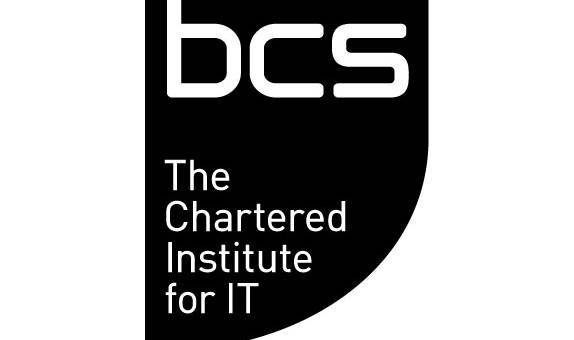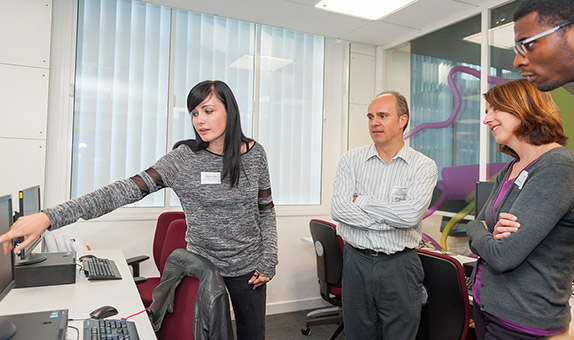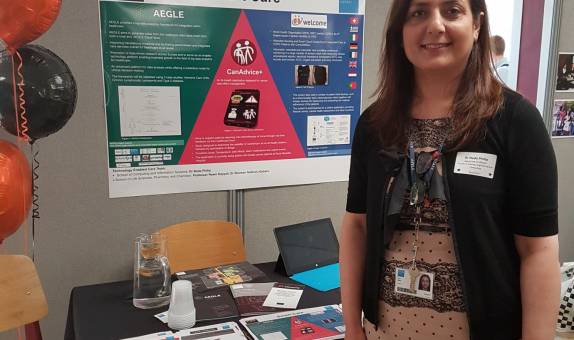Computer Science BSc (Hons)

Teaching Excellence Framework (TEF) Gold award
Our commitment to high quality teaching has been recognised with a TEF Gold rating. The University has received an overall rating of Gold, as well as securing a Gold award in the framework's two new student experience and student outcomes categories.
Why choose this course?
Are you considering a career in computer science? Whether you have knowledge of the subject or not, this course at Kingston can make you an expert.
You can study specialist areas of computer science that are relevant to the career you want. There are modules that reflect the most in-demand sectors in the industry, such as software engineering, project management, user experience design, web and mobile app development, networking, and network security.
You'll graduate having gained experience of applying your expertise to real-world problems. With a portfolio of products and artefacts to showcase your work, you'll be ready to begin a professional career.
| Attendance | UCAS code/apply | Year of entry |
|---|---|---|
| 3 years full time | G401 | 2024 (Clearing) 2025 |
| 4 years full time including sandwich year | G400 | 2024 (Clearing) 2025 |
| 4 years full time including foundation year | G403 | 2024 (Clearing) 2025 |
| 6 years part time | Apply direct to the University | 2024 (Clearing) 2025 |
Please note: Teaching on this course may take place on more than one KU campus.
| Main Location | Penrhyn Road |
Reasons to choose Kingston University
- The course is informed by our academics' expertise in topics such as artificial intelligence, robotics, user experience design, digital healthcare, mobile networks and computer vision.
- The course features guest lectures from leading industry practitioners, such as Sony, Google and IBM.
- Develop your programming skills with our exclusive NoobLab online learning environment, which makes programming accessible and fun regardless of your prior expertise.
- Kingston University is ranked No.5 in London for Computer Science and Information Systems (The Guardian University Guide 2024).
What you will study
Our programme structure is centred on student learning and development, to encourage you to become an effective, independent and confident self-directed learner – attributes which appeals to employers. Supported by a set of guided learning journeys, you will learn theoretical and practical aspects of system design and development, and gradually develop a portfolio of 'products' and 'artefacts' of different levels of complexity as the outputs of assignments in dedicated modules.
They will be integrated into an online portfolio of applications and design solutions that reflect your professional readiness. The first year of the course consists entirely of core modules to provide the fundamental computer science knowledge; you will examine computer architectures, and the tools and techniques used to build systems.
You will learn principles, techniques and tools common to the analysis and design of software development, and study the impact of technologies on the workplace, economy and society. In the second and third years you will focus more on the chosen specialist area, and using a combination of core and optional modules you will be exposed to the latest software innovations, design patterns, algorithms, programming languages, data structures and tools. For example, you will learn the latest agile project management approaches, data modelling using UML, relational and object-oriented database systems, data processing platforms used for big data applications, processing of data sets with adaptive algorithms driven by machine learning, visualisation of data for business insight.
The guided route you select will enable you to gain expertise of the chosen area and explore the latest innovations associated with a specific domain in-depth, building on the foundation set by the core modules. If you do not wish to follow a guided route you can choose any of the available options where the pre-requisites are met and are always guaranteed a broad grounding in computer science. You can use the individual project module in the third year to showcase the knowledge and skills you have gained.
You will study four modules in each year, for example:
Students wishing to pursue the software engineering and database guided option routes will take in Year 2 Computing Systems and Professional Environments 2 as core modules and option modules Programming 2 - Software Development and Database-Driven Application Development, and in Year 3 the core module is Individual Project, the guided option is Programming 3 - Patterns and Algorithms plus recommended option modules Advanced Data Modelling and Software Development Practice.
Year 1
Year 2
Optional sandwich year
Year 3/4 Core modules
Year 3/4 Optional modules
First year provides a broad exposure to the essential domain topics; computing fundamentals, programming, professional practice and system designing.
Core modules
Computing Fundamentals
30 credits
In this module, you will develop a strong foundation of how computers work in terms of hardware and software, and the formal logic behind it. You will have the opportunity to meet several different experts in the topics that form the basis of modern-day computer science.
To equip you to excel in your course, the subject experts will guide you in an exploration of digital logic, data processing, representation and storage, essentials of computer software and hardware including architectural concepts and relevant data structures and algorithms.
You will develop this knowledge further through the introduction of databases, web development, and the underlying technologies of modern-day communication, including Ethernet, Wi-Fi and the Internet.
Programming I: Thinking Like a Programmer
30 credits
We designed this module to establish a foundation for key Programming Concepts. We do not assume prior experience of programming, as we know you will all have widely different levels of existing knowledge. The module is designed to be accessible to a beginner while still being exciting for an experienced coder.
We are excited to be able to deliver this module using Kingston's own home-grown learning environment for programming, NoobLab. NoobLab gamifies your learning, making programming enjoyable and accessible for all existing ability levels – no other university offers this platform or unique approach to learning:
You will learn a variety of programming languages. In the first few weeks, we will use visual blocks that will allow you to construct programs and focus on thinking like a programmer rather than getting bogged down in grammar and syntax. Then, with these skills established, you will learn Python, Javascript and optionally Java, solving "Code Kata" style programming challenges on a weekly basis. This will equip you to build a graphical card game as your capstone project for the module.
Requirements Analysis and Design
30 credits
Good design is the key to good software, and at the heart of good software design is Requirements Analysis.
You will learn how to identify project stakeholders and your prospective target audience of a software project, and carry out an effective stakeholder and user analysis. This will entail learning how to capture, evaluate, validate, and document requirements, using appropriate industry-standard methods, techniques, and tools.
Additionally, you will learn the principles of software project management using Agile, iterative methodologies and have the opportunity to develop hands-on experience in an Agile project team.
Another key aspect of this module is learning and applying the elements of good user experience (UX) design. By the end of the module you will be able to use a prototyping tool to build wireframes, user interfaces and interactive prototypes, incorporating specific usability requirements and UX design principles. These skills will be applied when you build a high-fidelity prototype using contemporary software tools.
Finally, you will learn how to conduct usability evaluations and analyse results to draw subsequent design recommendations to iteratively improve your work and make it better fit for purpose.
Professional Environments 1
30 credits
The goal of the Professional Environments module is to prepare students for professional practice. It will firstly ensure they acquire suitable employability assets and secondly equip them with an understanding of the role of a professional in society and the role of professional bodies.
While the bulk of the taught programme focuses primarily on domain knowledge, the Professional Environments module focuses on developing key skills, personal qualities (e.g. commercial awareness, reliability and punctuality, understanding the centrality of customers and clients), and professional knowledge including the need to engage with continuing professional development. With such assets, students will generate a CV, an employment portfolio, and a professional online presence.
Being a professional also means understanding the key legal, ethical and societal issues pertinent to the domain, and understanding the need for continuing professional development (CPD) especially when technology develops at such a rapid pace. The module is designed to support different domain areas and to integrate experience from other professions. The subject areas being studied demand a global perspective which encourages the inclusion of our diverse of communities and national practices.
Reflecting the fact that team working is ubiquitous in the modern workplace, a significant proportion of the assessment work on the course is based around group work. There is considerable evidence that group work promotes a much deeper engagement with taught content and the Future Skills report shows how it is embedded in working practices. It also encourages the development of diverse learning communities with computer science, cybersecurity and digital media students working in close proximity. This module will therefore introduce students to best practice in group working covering how to approach group work, how to understand yourself, how to deal with different types of people, and methods of selecting and managing groups.
Core modules
Computing Systems
30 credits
This module takes you on a journey, from underlying computer architecture through to operating systems and networking and finally on to cloud computing. We designed this module to enhance your understanding of how modern computer systems are designed and used.
You will explore the essential features of each of these technologies and acquire both theoretical and practical knowledge. In addition, you will also develop knowledge of containerisation, parallel programming and algorithm complexity to make use of new parallel and cloud computing architectures to design application scenarios for today's modern computing environments.
Professional Environments 2
30 credits
This module is designed to encourage you to look outwards to industry and employability, and make you more confident when facing the job market upon graduation. You will develop excellent group working skills, broaden your understanding of industry and its requirements, and enhance your project management skills.
It is always exciting to watch the groups collaborating as they produce their entrepreneurial projects for Kingston University's "Bright Ideas" scheme; students involved in this have won awards, producing fascinating artefacts for their remaining term and exploring new and different areas within their course field.
The module is an opportunity to work with many different students, working in subject areas that are innovative and unusual. Very often, a student may discover something they did not know that they could achieve. This triggers new learning and an added confidence that was not previously there. Those are the times that the learning is strongest, and our pride in the student, the greatest.
Optional modules
Programming II - Software Development
30 credits
This module takes what you did in Programming 1, where you started to think like a programmer, and focuses on one programming language to develop software applications that people can interact with.
You will continue to use Kingston's bespoke NoobLab in the first term – no other university offers this platform or unique approach to learning – to go into more depth in creating models of "real world" objects, as well as data structures like arrays, lists and maps, and reading/writing files. In the second term you will build simple applications (graphical user interfaces).
You will use Java Swing as the basis for a graphic user interface, drawing on the Java Collections Framework as needed to build data structures for your applications. We will introduce industry-standard development environments such as NetBeans and Visual Studio Code, alongside GitLab for source and version control of your code.
Human Computer Interaction Design and Evaluation
30 credits
This is an optional module intended for undergraduate students who are studying computing-related subjects.
HCI is the core academic discipline that examines the relationship and interface between human and computer. It informs and provides the theoretical and methodological foundation for user experience, the professional discipline which is practically applied. Although this module forms part of the user experience guided pathway it can be taken as a standalone module.
You will explore major themes in HCI from both a theoretical and a practical perspective. The module will establish an understanding of key concepts within HCI theory and methods, and examines techniques for HCI design and evaluation. It offers you a practical domain in which to apply knowledge and skills, including those from other modules, to the design, implementation and analysis of interfaces between people and computer systems. You will undertake practical exercises in which you will evaluate real-world problems to identify user experience issues. You will utilise the synthesis of data from methods which explore user needs and requirements and also users' cognitive models to build a suite of artefacts e.g. personas, user journeys, empathy maps etc which will inform a prototyping phase. This process involves iteratively building on low, medium and high fidelity prototypes of increasing complexity and levels of iteration. Thus you will synthesise theory and empirical data to build your prototypes of a redesign solution to usability issues. These artefacts will iteratively and incrementally inform a user centred design.
Database Driven Application Development
30 credits
In this module you will learn to design and build full stack web applications. The first half of the module will be dedicated to relational databases which are crucial to any company or organisation, and form the back-end persistence layer of the vast majority of modern applications. You will learn the fundamental concepts and principles of database design before moving on to building the databases and writing queries to extract data from the database.
Once you have the foundation of database development, the module will move on to teaching you to develop and deploy web based applications that use an MVC design pattern. You will learn server- and client-side development, how to access the database/persistence layer, and techniques and technologies that span the whole stack. By the end of the module you will have gained the skills to build a complex, scalable and robust web application driven by a back-end database.
Networking Concepts
30 credits
With a strong emphasis on understanding the Internet protocols, the Networking Concepts module will develop your understanding of the basic principles of networking.
You will become familiar with current LAN and WAN technologies and their role in building domestic and corporate networks. This knowledge will underpin the skills required to design and simulate small company networks including identifying the physical components required and to design an appropriate IP addressing schemes for such network.
It will also underpin your understanding of how network services such as mobile apps and network-based games are implemented.
Core modules
Industrial Placement
60 credits
This module is an essential course programme component for students on the sandwich route of an honours degree "with professional placement". It is a key element in providing an extended period in industry gaining real world employability skills. Students are supported both before and through their placement by the Placement Team. Students that successfully complete their placement year will graduate with a four-year sandwich degree.
Core for all guided routes
Individual Project
30 credits
The goal of the module is to further develop skills in organisation, timekeeping, research literature, developing and critically analysing results as well as reporting work verbally and in a written format. The end result will be an artefact or artefacts which demonstrate creativity and technical competence as well as a technical report.
Software Engineering route
Programming III – Patterns and Algorithms
30 credits
Programming is a central activity of software development, which encompasses a wide range of languages, environments and specialisms.
This module will offer students the opportunity to acquire a useful competence across this range. The first teaching block will cover aspects of language, algorithms, tools, test-driven methodologies, and a range of user interface technologies.
The second teaching block will apply these themes across a range of technologies and application environments, focusing on web and mobile in particular. Assessment will include computer-based in-class tests and e-portfolios of student achievement that allow them to curate and share their passion for programming.
User Experience Design route
User Experience Design Thinking
30 credits
This is an optional module intended for undergraduate students who are studying Computing-related subjects. Although it forms part of the User Experience guided pathway it can be taken as a standalone module and previous experience of UX is not assumed. This module will focus upon the skills, methods and tools required in careers such as UX Architect, UX Designer, Service Designer, Information Architect or Digital Product Designer. The curriculum is finely balanced between theory and practice. Students are directly immersed in organisational practices and skills used in industry and will make use of academic theory in this practical context. Students will learn to develop investigative, analytical, technical, communication and advocacy skills to help them shape interactive technologies that augment people's abilities, enhance their creativity, connect them to others and protect their interests. They will also become aware of the impact of levels of digital literacy, availability of and access to technology, economic and business drivers, regulations, and regional/cultural norms. The module will also develop methods and skills required to understand current users, to investigate non-use, and to imagine future users.
Networking and Network Security route
Cryptography and Network Security
30 credits
This is a core module in the Cyber Security and Computer Forensics field which explores the major challenges to computer security.
It familiarises students with a range of cryptographic algorithms and protocols, firewall and access-control architectures and methods to assess and improve network and application security. This knowledge will allow students to implement and evaluate security controls and develop secure policies for corporate networks.
Web and Mobile App route
Mobile Application Development
30 credits
While this module provides a foundation for careers in mobile application development, mobile is becoming increasingly ubiquitous and the skills taught also have applications in UX, web development and software engineering in general. Although there are no prerequisites, it is assumed that students have acquired a general familiarity with programming and software development principles through their previous study.
The module is divided into two phases. In the first phase of the module students will be introduced to software development for the two major mobile platforms. This will cover development environments for these platforms, UI conventions, building and deploying simple applications. Students will then be introduced to cross platform development environments for mobile development.
Finally, standard frameworks for mobile web development will be introduced. The second phase of the module is organised around a practical project. Students will choose one of the platforms on which to build a mobile application of their choice. This project gives students the opportunity to specialise and explore their chosen platform in greater depth, acquiring the knowledge and proficiency to be able to design and build complex mobile apps. Students will be encouraged to publish their apps in one or both (in the case of a cross-platform app) of the two major app stores, thus providing an introduction to mobile application delivery and distribution.
Optional module
Digital Entrepreneurship
30 credits
Entrepreneurship is a major driving force in creating economic growth and this module illustrates how to work in an entrepreneurial fashion. At the heart of entrepreneurship is innovation, which can come in many forms. Sometimes this can be an incremental but generally gives significant improvement to the customer. Alternatively it is a new breakthrough or transformational innovation. Incremental innovation is aimed at increasing the value of a product or service, to add more value and thereby creating new and superior value chains. Breakthrough innovation often creates new categories of product, or transforms the historical ways of doing things.
From this foundation, the module proceeds to explain how to develop a strategy, not only to satisfy the critical needs that organisations have, but also to explore the application and use of improved value chains using the concepts of corporate venturing (spin-out/intrapreneurship) and entrepreneurship (new venture creation).
However it is not simple to start a new company. Especially the tech branch is characterised by fast developments, shifts of focus and low barriers to entry, where holding back from "bleeding edge" is essential and is one of the important differentiating factors between Tech Entrepreneurship and other forms of entrepreneurship. This means that one can no longer count on "good luck", and insight, understanding, knowledge and a systematic approach all have to be learnt.
This module will convey the concepts needed for roles in analysis, consultancy and management in technology environments, plus the necessary knowledge to work successfully in an innovative company, as well as providing a good background for new venture creation (Entrepreneurship) for those considering self-employment or founding new technology firms
Recommended for Software Engineering route
Software Development Practice
30 credits
This module will expand your skill set and your awareness as software industry professional, using industry-relevant tools, know-how, as well as theoretical areas. Our focus is on real-world experience, and preparing you to become a skilled graduate, regardless of the job roles you are considering or the skills you want to expand on within the computing domain.
This will empower you to become better at whichever role you are aiming at; developer, analyst, designer, project manager and so on. This is not a code-centric module; the skills in this module are more concerned with efficiently working within a software development team and managing the code produced rather than necessarily writing code yourself.
You will explore the latest practices for making more dependable, reusable and scalable software systems, and how to configure, maintain and support such systems. We will also discuss topics on software architecture, and how to select the right architecture based on the system requirements. We will also cover popular industry practices like refactoring, software measurements, DevOps, Microservices, and software testing approaches, and even a bit of Quantum computing.
The workshop activities promote collaborative learning. Within the first teaching block you will explore a specific topic or tool every two weeks. In the second teaching block, you will work as a team, taking up a role as a manager, developer, analyst, designer, security expert or tester and work on a software development case study.
Most of the topics and tools you come across in the module are linked to skills advertised as essential or desirable by software industry employers. They are also closely linked to interview questions or assessment centre activities. Overall, the main focus of this module is to equip you to become a skilled and knowledgeable IT professional capable of facing challenges, while maintaining a holistic, practical perspective on the issues at hand.
Recommended for User Experience Design route
Mobile Application Development
30 credits
While this module provides a foundation for careers in mobile application development, mobile is becoming increasingly ubiquitous and the skills taught also have applications in UX, web development and software engineering in general. Although there are no prerequisites, it is assumed that students have acquired a general familiarity with programming and software development principles through their previous study.
The module is divided into two phases. In the first phase, students will be introduced to software development for the two major mobile platforms. This will cover development environments for these platforms, UI conventions, building and deploying simple applications. Students will then be introduced to cross platform development environments for mobile development.
In the second phase, standard frameworks for mobile web development will be introduced. The phase is organised around a practical project. Students will choose one of the platforms on which to build a mobile application of their choice. This project gives students the opportunity to specialise and explore their chosen platform in greater depth, acquiring the knowledge and proficiency to be able to design and build complex mobile apps. Students will be encouraged to publish their apps in one or both (in the case of a cross-platform app) of the two major app stores, thus providing an introduction to mobile application delivery and distribution.
Recommended for Networking and Network Security route
Internet Protocols and Services
30 credits
This module focuses on enterprise networks; the internet protocols and services which will develop the understanding of how the TCP/IP internet protocol suite achieves the interconnection of geographically separate computers over networks of arbitrary topology and technology. This knowledge will underpin the design skills required to design such company networks including identifying the physical components required and designing appropriate IP addressing schemes. The module introduces wireless and high-speed networks and how these are used to deliver a variety of business applications.
On successful completion of the module, you will be able to:
- Explain the basic principles of internetworking, and describe the role of each protocol within the TCP/IP protocol stack.
- Identify the main hardware network components used to construct enterprise networks, and be able to design a network for a small enterprise.
- Demonstrate a thorough understanding of IPv4 and IPv6 addressing, sub-network addressing, and be able to design an IP addressing scheme for a domain.
- Demonstrate how internet application services (e.g. HTTP) available on any of today's advanced operating systems depend on and interact with other TCP/IP protocols, and explain the role of DNS and DHCP services in the configuration of network hosts.
- Demonstrate an awareness of the services available from the internet and network providers to support business and homes and be able to critically reflect on the legal, social, economic and ethical issues associated with the use broadband services.
Recommended for Web and Mobile App route
Advanced Data Modelling
30 credits
This module will consolidate and build on previously acquired knowledge of databases by analysing and evaluating important issues in the database area. In addition, advanced aspects of data warehousing and data mining will be studied, encompassing the principles and commercial application of the technologies.
Please note
Optional modules only run if there is enough demand. If we have an insufficient number of students interested in an optional module, that module will not be offered for this course
Foundation year
If you would like to study computing at Kingston University but are not yet ready to join the first year of a BSc (Hons) course, you can include an extra foundation year within your chosen degree. Please see the foundation year course page for details of modules.
Computer Science at Kingston
Future Skills
Knowledge to give you the edge
Embedded within every course curriculum and throughout the whole Kingston experience, Future Skills will play a role in shaping you to become a future-proof graduate, providing you with the skills most valued by employers such as problem-solving, digital competency, and adaptability.
As you progress through your degree, you'll learn to navigate, explore and apply these graduate skills, learning to demonstrate and articulate to employers how future skills give you the edge.
At Kingston University, we're not just keeping up with change, we're creating it.

Future Skills for computing
Accreditation
This degree has been accredited by BCS, The Chartered Institute for IT. Accreditation is a mark of assurance that the degree meets the standards set by BCS. An accredited degree entitles you to professional membership of BCS, which is an important part of the criteria for achieving Chartered IT Professional (CITP) status through the Institute. Some employers recruit preferentially from accredited degrees, and an accredited degree is likely to be recognised by other countries that are signatories to international accords. This degree is accredited by BCS for the purposes of fully meeting the academic requirement for registration as a Chartered IT Professional.
This degree has been accredited by BCS, on behalf of the Engineering Council for the purposes of partially meeting the academic requirement for a Chartered Engineer (CEng). Accreditation is a mark of assurance that the degree meets the standards set by the Engineering Council in the UK Standard for Professional Engineering Competence (UK-SPEC). An accredited degree will provide you with some or all of the underpinning knowledge, understanding and skills for eventual registration as an Incorporated (IEng) or Chartered Engineer (CEng).
Entry requirements
If you would like to join us through Clearing 2024, please call our Clearing line on 0800 0483 334 (or +44 020 8328 1149 if you are calling from outside the UK) and speak to our friendly and knowledgeable hotliners who will be able to provide information on available courses and will guide you through your options.
Please note the entry requirements listed below are for 2025 entry only.
Teaching and assessment
Scheduled learning and teaching on this course includes timetabled activities including lectures, seminars and small group tutorials.
It may also include placements, project work, workshops, workshops in computer labs, and laboratory workshops.
Facilities
This course is taught at the Penrhyn Road campus, which offers a range of facilities. A modern environment with the latest hardware and software will be available to you, including:
- state-of-the-art computer laboratories with high-performance workstations, including some with dual large-screen monitor configurations
- access to a High-Performance Computing (HPC) facility for more complex computation
- our home-grown NoobLab environment, only available at KU, which is designed to make learning programming accessible and fun
- high-spec gaming PCs, with powerful dGPUs
- the latest integrated development environments for games and software development, including the latest games console dev kits
- access to VR and AR headsets
- platforms and components for embedded systems development
- Cisco Networking Software IOS, which is the world's most widely deployed networking software
- Network Simulator 3 (NS-3) and MATLAB for Wireless (WiFi, 5G and Beyond) and Multimedia Networks
- our dedicated team of IT technicians, supporting the labs and always on hand to provide assistance.
Who teaches this course?
The course is taught at the School of Computer Science and Mathematics.
The School of Computer Science and Mathematics is driven by the philosophy of 'learning through making'; we focus strongly on facilitating a hands-on experience, student led and owned product portfolios and producing industry-ready graduates.
We utilise a range of innovating teaching and learning approaches in our invigorated and modernised degree programmes; combining studio practices, project-based learning, and context driven lectures to facilitate an informed approach to problem solving.
Postgraduate students may run or assist in lab sessions and may also contribute to the teaching of seminars under the supervision of the module leader.
Course fees and funding
Additional costs
Depending on the programme of study, there may be extra costs that are not covered by tuition fees which students will need to consider when planning their studies. Tuition fees cover the cost of your teaching, assessment and operating University facilities such as the library, access to shared IT equipment and other support services. Accommodation and living costs are not included in our fees.
Where a course has additional expenses, we make every effort to highlight them. These may include optional field trips, materials (e.g. art, design, engineering), security checks such as DBS, uniforms, specialist clothing or professional memberships.
After you graduate
This degree is excellent preparation for a wide variety of careers, such as systems and business analysts, software engineers, programmers and network specialists.
What our students say
Computer Science at Kingston University
What our graduates say
Links with business and industry
Computing qualifications are amongst the most versatile and enable graduates to find employment in a wide spectrum of careers ranging from systems and business analysts, and software engineers, through to programmers and network specialists in a wide range of public and private sector industries.
Our curriculum is largely applied in nature with many case studies chosen for their topicality and relevance to industry such as information systems design, programming, networking, and implementation issues. Working on case studies designed to simulate the working environment, typically in teams, gives students experience of applying their skills to real-world problems.
To further set the material in context as well as inspire our students leading practitioners from industry, such as Google and IBM are invited to give guest lectures and workshops. The school hosts a local BCS chapter and several members of the School are involved with the Institute at corporate level.
Placement case study – Jake Berry
We spoke to Jake about his experience on a work placement.
Work placement year
How you can work in industry during your course
Placements:
- provide work experience that is relevant to your course and future career
- improve your chances of graduating with a higher-grade degree
- enhance your CV
- lead to a graduate job
- enable you to earn a year's salary whilst studying (the vast majority of placements are paid)
- help you to select your final-year project.
"To be successful, tomorrow's leaders will need to be far more rounded individuals than ever before. They will collaborate in pursuit of shared goals. They will guide, challenge and support...They will have an appetite for change and a hunger for continuous improvement, and they will have an ethos of learning and development..." Jeremy Darroch, Former Chief Executive, Sky.
"Doing a placement year effectively gives you one foot in the door of a future job and to stand out from the crowd... as well as enhancing my CV... and future interviews. It's a great motivator to be successful in my studies as it only serves to open even more doors and gain more skills." Placement student at Jagex Games Studios Ltd.
There is a lot of support available for students looking to secure a placement (e.g. a jobs board with placement vacancies, help with writing CVs and mock interviews). Getting a placement and passing the placement year are ultimately the student's responsibility.
Examples of placements
Placements can be with large multinational companies, international companies, local companies and small start-ups; offering a diverse range of posts. Here are some examples of employers and roles:
| Construction-based placement employers | Construction-based placement roles |
|---|---|
| RG Group Multiplex Costain Willmott Dixon Fluor |
Assistant site manager Assistant trades package manager Assistant logistics manager Health and safety officer Construction engineer |
| Science-based placement employers | Science-based placement roles |
| Reckitt and Benckiser GSK Drug Control Centre Minton Treharne and Davies Ltd Various local and international hospitals |
Bioanalytical sciences Lab assistant Pharmacy assistant Sports coach |
| Engineering-based placement employers | Engineering-based placement roles |
| Airbus BAM Nuttall Nissan Bosch Wozair |
Analysis of aircraft structure Construction resources specialist Site engineer assistant |
| Computing and IS-based placement employers | Computing and IS-based placement roles |
| Disney Sony Interactive Entertainment Europe IBM McKinsey Intel |
Database coordinator Software developer Website developer App developer |
| Mathematics-based placement employers | Mathematics-based placement roles |
| Lloyds Banking Group AXA Allianz PAU Education, Spain |
Analyst Investment solutions Research analyst Accounts assistant |
Key information set
The scrolling banner(s) below display some key factual data about this course (including different course combinations or delivery modes of this course where relevant).
Course changes and regulations
The information on this page reflects the currently intended course structure and module details. To improve your student experience and the quality of your degree, we may review and change the material information of this course. Course changes explained.
Programme Specifications for the course are published ahead of each academic year.
Regulations governing this course can be found on our website.






















